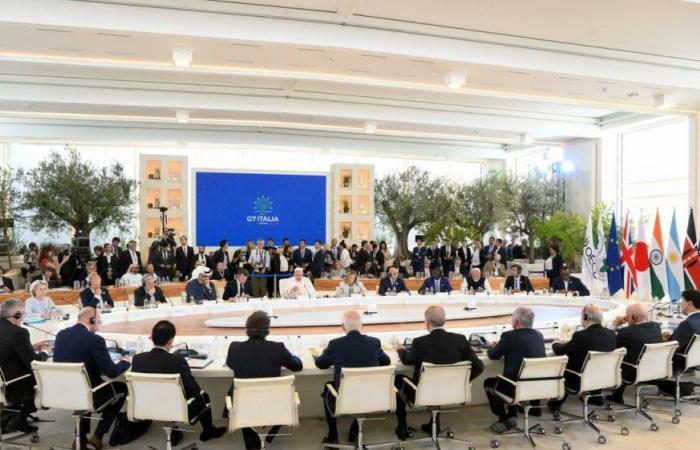A G7 which is almost a G30. Giorgia Meloni’s imprint on the Apulian summit, after all, lies above all here. Not only in the “concrete commitments” made, or in the “compactness” demonstrated. But above all in the twenty-five chairs arranged around the table from which, for the first time in the history of the summit, a pontiff spoke. “We will never accept the narrative of the West against the rest of the world” are not by chance the words with which the prime minister addressed the Seven (whom she thanked by calling them by name, in the evening, in the video message posted on her social networks) and to the many outreach guests present in Borgo Egnazia, additional to the traditional format. “We know that we can face global challenges if we are able to collaborate with respect and an equal approach” she explained in front of the presidents – among others – of India, Brazil, Turkey and Argentina. Identifying the most pressing ones in artificial intelligence (which is a risk as much as an opportunity as Pope Francis also explained), the Mediterranean (also an area “of crisis and opportunity”), and Africa, “with where we want to build a new cooperation as equals.” The latter, moreover, is the theme on which Meloni built a large portion of her narrative, threatened for much of the summit by the “electoral moves” with which Emmanuel Macron made her furious several times.
(Much) nervousness aside, the prime minister ultimately managed to impose the theme within the final conclusions – explain Italian sources – obtaining the applause of the historic allies through the desire to “strengthen dialogue with the nations of the South of the world” and, in the words entrusted to the post, insisting on a G7 which “is not a fortress closed in on itself” but “an offer of values that we open to the world”. And in fact in the final joint declaration the ambition is signed for the “spirit of fair and strategic partnership” with which to guarantee sustainable development and industrial growth for populations and at the same time carrying forward “efforts” to invest in sustainable infrastructures, also through Pgii (the G7 Partnership for Global Infrastructure and Investment of US origin and anti-Chinese perspective).
In this sense, the leaders “welcome the Mattei Plan”, a true Melonian workhorse and one of the pillars on which the prime minister has built her support for Ursula von der Leyen. At least during the last European legislature. For the next one? Still hard to say. Officially Meloni has not met bilaterally with any of the European leaders with whom she will have dinner on Monday evening in Brussels, but she limited herself to meeting the Indian Narendra Modi, the Japanese Fumio Kishida and, above all, the American Joe Biden. And, to avoid any misunderstanding, those who were alongside her during these two days also deny any comparisons on the sidelines, citing the very busy agenda dictated by the prime minister’s role as president of the G7. However it happened, it is not certain that the issue will come to a head soon. Informed sources in fact reveal the Italian desire to “take advantage of all the time available” to count as much as possible in the arrangements of the next European Commission. Even waiting, in a game of nerves and calculations, for the next French elections.
MIGRATIONS
The leaders’ applause for the Italian presidency, however, came above all in relation to the decision to include the topic of migration in the agenda and, consequently, for the first time in the final conclusions. «I am proud that Italy has amazed and charted the course» says Meloni. The objective was “to develop a new strategy” says the prime minister, presenting the “coalition to prevent and combat migrant trafficking”. A prodromal announcement “to the collective commitment and strengthened cooperation on migration”, which the G7 sees as crucial “to face the challenges and seize the opportunities it presents, in partnership with the countries of origin and transit”. Moreover, with an executive approach, which borrows the follow the money principle. «We will focus on the root causes of irregular migration, on efforts to improve border management and curb transnational organized crime and on safe and regular routes for migration» the dedicated paragraph ends. In this case, perhaps, that of the West against the rest of the world is not such a distant reading from reality.
© ALL RIGHTS RESERVED
Read the full article at
The messenger





